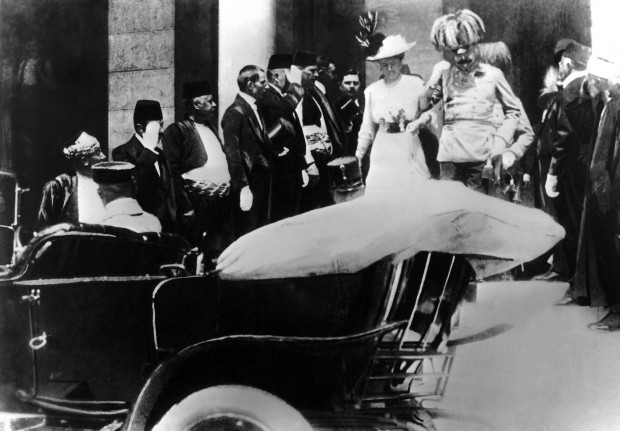by Jim Lobe
In just a week, 2014 will dawn upon us, and, as we approach the mid-year mark, the number of op-eds, retrospectives, and documentaries about the Great War that broke out 100 years before, will likely be overwhelming. The question is what, if any, lessons will be drawn and how they will be applied, if at all, to today.
Hopefully, it won’t be too late by the time we mark the “Guns of August” to prevent the United States — and specifically, the U.S. Congress – from having embarked on a new “march of folly” — war with Iran. But if bipartisan stalwarts of the Israel lobby — led by Sens. Mark Kirk and Robert Menendez — get their way with their new sanctions legislation, which almost perfectly echoes the demands made by Israeli Prime Minister Binyamin Netanyahu for Iran to dismantle virtually all of its nuclear program, I suspect that’s where we’ll be headed.
Perhaps that’s partly why Margaret MacMillan, the author of The War That Ended the Peace: The Road to 1914, suggested in a recent “Brookings Essay,” entitled “The Rhyme of History: Lessons of the Great War,” that Russia’s seemingly unconditional and ultimately disastrous commitment to Serbia in the name of “Pan-Slavism” — as well as the infamous “blank check” issued by Germany’s Kaiser Wilhelm to Austria after the assassination in Sarajevo of Archduke Franz Ferdinand — may indeed hold important lessons for today:
Great powers often face the dilemma that their very support for smaller ones encourages their clients to be reckless. And their clients often slip the leading strings of their patrons. The U.S. has funnelled [sic] huge amounts of money and equipment to Israel and Pakistan, for example, as China has done to North Korea, yet that has not given either the Americans or the Chinese commensurate influence over the policies of those countries. Israel, while hugely dependent on America, has sometimes tried to push Washington into taking pre-emptive military action.
Of course, that’s precisely what is taking place before our eyes in the U.S. Congress today. After all, when 27 senators sign onto what I called the Kirk-Menendez-Schumer Wag the Dog Act of 2014 that explicitly calls for the U.S. government to “stand with Israel and provide, in accordance with the law of the United States and the constitutional responsibility of Congress to authorize the use of military force, diplomatic, military, and economic support to the Government of Israel in its defense of its territory, people, and existence [if the Israeli government] is compelled to take military action in legitimate self-defense against Iran’s nuclear weapon program,” you can’t help but be reminded of Russia’s incredible stupidity in reflexively backing Serbia and the radical nationalist groups that it supported in the run-up to the war, not to mention Wilhelm’s blank check to an Austria bent on humiliating and crushing the Serbs.
Ten years ago, Anatol Lieven drew the former parallel in his still-very-relevant book “America: Right or Wrong” (Oxford University Press):
If anything, the [U.S.-Israel] alliance is beginning to take on some of the same mutually calamitous aspects as Russia’s commitment to Serbia in 1914, a great power guarantee which encouraged parts of the Serbian leadership to behave with criminal irresponsibility in their encouragement of irredentist claims against Austria, leading to a war which was ruinous for Russia, Serbia, and the world.”
Lieven went on to document the various trends over the past half century that have increasingly enabled the Israeli tail to wag the U.S. dog — trends that have only deepened during the past decade despite the steadily rightward trajectory of Israel’s government and the advent of a Democratic administration clearly wary of Israel’s adventurism. Unfortunately, that administration gets very little support from a Congress that, when it comes to Israel and Iran, has, as former senior AIPAC official Douglas Bloomfield told me last week, been “on auto-pilot” for years, just as hardliners in the militaries and imperial courts in St. Petersburg and Vienna were one century ago.
No doubt most of the senators who sign on to the Wag Act don’t want war (although their main cheerleader, Lindsey Graham, has been calling for it for several years now) and sincerely believe that a new sanctions bill will only strengthen Obama’s hand in negotiations with Iran and that Tehran’s threat to abandon the talks is simply bluster. No doubt some pan-Slavists in St. Petersburg believed that the partial mobilization ordered by the Czar, who, like Obama, tried hard to keep diplomacy alive, would be sufficient to persuade Vienna to back down and give the Serbs a face-saving way out. (“Soon I shall be overwhelmed by pressure brought upon me…to take extreme measures which will lead to war,” Nicholas wrote to his cousin, Kaiser Wilhelm, as Austria declared war. “To try and avoid such as a calamity as a European war, I beg you in the name of our old friendship to do what you can to stop your allies from going too far.”) But it didn’t work out that way.
Of course, there are important differences between today and 100 years ago, including the fact that Iran doesn’t have an obvious great-power patron as Russia was to Serbia and Germany to Austria back then. Similarly, it was clear that some of the parties were eager for war (although not the one that they eventually got) in 1914, while the only country that openly threatens it today is Israel (although, as Michael Ledeen has pointed out, it has long been Israel’s policy to try to get the U.S. to attack first).
But some of the similarities are deeply disturbing, not least the “blank check” treatment that Israel enjoys in Congress and the confidence that only threats and pressure work against less powerful and presumably morally inferior foes. How timely it is to remember Wilhelm’s joyful reaction to reports that Austria would not retreat from the maximalist demands in its ultimatum against Serbia and how depressed the Serbs were when faced with the choice of humiliation or war:
“Bravo! One would not have believed it of the Viennese!…How hollow the whole Serbian power is proving itself to be; thus, it is seen to be with all the Slav nations! Just tread hard on the heels of that rabble!” [Shades of Charles Krauthammer.]
Or how prescient British Prime Minister Lord Asquith was in analyzing the likely consequences of the Austrian ultimatum:
But the Austrians are quite the stupidest people in Europe …, and there is a brutality about their mode of procedure, which will make most people think that is a case of a big Power wantonly bullying a little one. Anyhow, it is the most dangerous situation of the last 40 years.
Hopefully, the Great War’s centenary will spur some reflection in the Capitol come the new year.






The US “forced” war on Japan? In fact, the US was doing Japan a favour, by insisting Japan get out of China.
@Reinhardt – – The Soviet Union of course celebrated its great victory in the Second World War. Which it was, given the grim curcumstances that would have obtained had Nazi Germany won. One might argue the USSR blundered badly in the decades after that victory.
Sir Edward Grey wondered whether he blundered by giving France too much confidence that it could act recklessly and count on British backing if war with Germany erupted.
Thanks, Simon. A key factor in setting up the catastrophe of 1914 was the belief by some leading German generals, that a victorious war was needed to make possible a suppression of the rising power of the Socialists in Germany.
The Russian Tsar could see that the war might easily prove calamitous for his own family and country, but he sadly lacked the parts to prevent the war from erupting.
James Canning:The US “forced” war on Japan? In fact, the US was doing Japan a favour, by insisting Japan get out of China.
Some “favor”, that. I can see it now “Mind if you get out of the territories you label ‘Our Manchuria’, little monkey men? The US wishes it! Have this little economic blockage in the meantime while we support the Chiang (until we drop him again)” That must have gone down well with ultranationalists fancying having some direct connection to Amataresu, indeed. Today one would start a “color revolution”, I suppose. Anyway, the Japanese military decided to try to break out of the economic blockade it was finding itself under (courtesy of Roosevelt who was to all evidence actively trolling for a Japanese first strike). They nicely convinced the emperor that there was some good chance of success. Big mistake.
A key factor in setting up the catastrophe of 1914 was the belief by some leading German generals, that a victorious war was needed to make possible a suppression of the rising power of the Socialists in Germany.
Never heard of that. Socialism was not exactly a force to be reckoned with in the Prussian Kaiserreich. The suppression of the Commune de Paris showed that deciders were not exactly reticent to use extreme force to keep the proles in line. Nationalisms, however, were starting to tear Österreich-Ungarn apart.
As an aside, note that as recently as 2010, WWI was retconned in the UK as a “fight for our freedoms” as opposed to a pointless intervention on the continent that one could well have done without at no ill effect. We might well have been spared the horrors of the two socialistic superblocks fighting it out between Berlin and Moskow. (Yeah I know.. MUH BELGIUM!! And BABIES IMPALED BY HUNS!!1!!1)